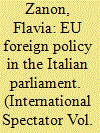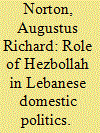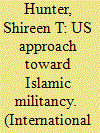| Srl | Item |
| 1 |
ID:
080536


|
|
|
|
|
| Publication |
2007.
|
| Summary/Abstract |
Governments have always been more reluctant to accept parliamentary oversight in foreign policy than in any other domestic policy field. This examination of the recent performance of the Italian Parliament in Common Foreign and Security Policy (CFSP) scrutiny and control in the two case studies of the EU's arms embargo against China and negotiations with Iran over its nuclear program shows that institutional arrangements concerning parliamentary control in this field have significant shortcomings. Although limited, the reforms under discussion in the new intergovernmental conference could contribute to improving the performance of parliaments and to creating a common awareness of the problem of democratic deficit in CFSP among the parliamentarians of EU member states
|
|
|
|
|
|
|
|
|
|
|
|
|
|
|
|
| 2 |
ID:
080534


|
|
|
| 3 |
ID:
080533


|
|
|
|
|
| Publication |
2007.
|
| Summary/Abstract |
The dynamics of change in the Arab world today are part of a much larger global process-the neo-liberal phase of globalisation-that started in the 1980s and engendered a process of state power restructuring, both for peripheral "weak" states and core industrialised countries. Beyond national differences, the restructuring of the Arab states has implied the consolidation of neo-authoritarian political regimes characterised by fragmentation of the power structure and by an increase in informal modes of government (neo-patrimonialism, corruption), accompanied by the parallel political and economic marginalisation of large sectors of society. These less centralised and more elitist regimes are likely to be more dependent and vulnerable than their predecessors to external pressures and foreign influence
|
|
|
|
|
|
|
|
|
|
|
|
|
|
|
|
| 4 |
ID:
080531


|
|
|
|
|
| Publication |
2007.
|
| Summary/Abstract |
Hezbollah emerged in 1982 as a manifestation of Iran's influence and a response to Israel's massive invasion of Lebanon. Hezbollah (cooperating with Syria) won legitimacy by resisting Israel's occupation, but it also offered Shias a credible ideology and an array of institutions. The party is now deeply embedded in Lebanese politics. After Israel's unilateral withdrawal in 2000, Hezbollah continued to assert its "national resistance" role, but this claim has been openly challenged, especially after the 2006 war. Since then, the government and the opposition have been at a dangerous impasse, with compromise elusive and the dangers of new violence growing
|
|
|
|
|
|
|
|
|
|
|
|
|
|
|
|
| 5 |
ID:
080535


|
|
|
|
|
| Publication |
2007.
|
| Summary/Abstract |
Saudi diplomacy seems more active than ever. This has to do with three recent major regional developments: the summer 2006 war between Israel and Hezbollah, the violent clashes between Hamas and Fatah in the occupied Palestinian territories, and the Iraqi quagmire. In each of these, the role of Iran is difficult to overlook and this is troubling Riyadh. Yet Saudi Arabia has difficulty in responding to Iran's assertiveness: it wants to contain Tehran's ambitions, but at the same time it cannot allow itself to clash with it. As a result, it is treading a fine line
|
|
|
|
|
|
|
|
|
|
|
|
|
|
|
|
| 6 |
ID:
080532


|
|
|
|
|
| Publication |
2007.
|
| Summary/Abstract |
Following the events of 9/11, the US declared a global war on terror and a new strategy based on preemption for defeating Muslim extremism and terrorism. However, the new US strategy so far has not been more successful than earlier strategies in combating either Muslim extremism or international terrorism. Arguably, it may even have contributed to the strengthening of the appeal of Islamic extremism and certain terrorist groups such as al-Qaeda. The principal reason for this lack of success has been the historically inconsistent and contradictory approach of the US to dealing with the problem of Muslim militancy and its manipulation of it for short-term objectives
|
|
|
|
|
|
|
|
|
|
|
|
|
|
|
|